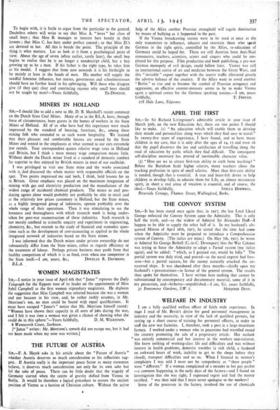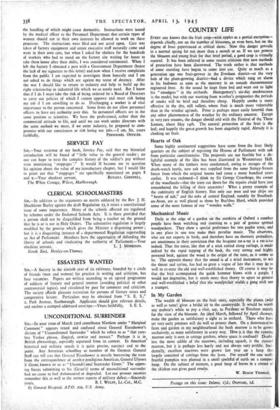WELFARE IN INDUSTRY
I am a fully qualified welfare officer of fairly wide experience. In 1940 I read of Mr. Bevin's desire for good personnel management in industry and the necessity, in view of the lack of qualified persons, for setting up a short course of training for personnel officers, in order to staff the new war factories. I, therefore, took a post in a large munitions factory. I worked under a woman who in peacetime had travelled round the country promoting the sale of a proprietary article. Her outlook
• was entirely commercial and her interest in the workers non-existent. She knew nothing of working-class life and difficulties and was without interest in health problems, domestic troubles (a sick child, a husband on awkward hours of work, inability to get to the shops before they closed), transport difficulties and so on. When I listened to women's complaints I was told I must not be sympathetic as " these people" were " different." If a woman complained of a mistake in her pay packet —a common happening in the early days of the factory—and I found on investigation that she was right, I expressed regret and had the matter rectified. T was then told that I must never apologise to the workers!
Some of the processes in the factory, involved the use of chemicals
the handling of which might cause dermatitis. Instructions were issued by the medical officer to the Personnel Department that certain types of women should not in their own interests be allowed to work on these processes. The instructions were filed and not acted upon. Care was taken of factory equipment and senior executive staff naturally came and went in their own cars, but when I asked for shelters for the hundreds of workers who had to stand on the factory site waiting for buses to take them home after their shifts, I was considered sentimental. When I left the factory I obtained a post with a Government Department (hence the lack of my signature to this letter) and now when I receive complaints from the public I am expected to investigate them honestly and I am not asked to do things which are against my sense of decency. After the war I should like to return to industry and help to build up the right relationship in industrial life which we so sorely need. But I know that if I do I must take the risk of being ordered by a Board of Directors to carry out policies of which I cannot approve and must risk losing my job if I am unwilling to do so. Discharging a worker is of vital importance to the person concerned. Some firms do not allow personnel officers to have any authority over this. So personnel officers are in the same position as scientists. We have the professional, rather than the commercial attitude to life, and until we can work under directors with the same outlook we must, if we enter industry, be prepared to com- promise with our consciences or risk losing our jobs.—I am, Sir, yours



























 Previous page
Previous page